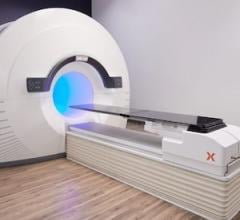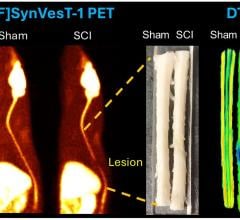May 21, 2012 — The Kimmel Cancer Center and the Department of Radiology at Thomas Jefferson University in Pennsylvania has received a five-year, $2.6 million grant from the National Institutes of Health (NIH). The grant will support investigations of a potentially revolutionary method that can stage prostate cancers and detect recurrent disease more accurately, significantly reducing the number of confirmation biopsies; such biopsies can be invasive, costly and often lead to false-positive readings.
The new technique involves the use of a positron emission tomography (PET) scan and a novel imaging agent. The study is being led by Mathew Thakur, Ph.D., professor of radiology at Jefferson Medical College of Thomas Jefferson University and the director of the Laboratories of Radiopharmaceutical Research and Molecular Imaging.
Prostate specific antigen (PSA) measurements, ultrasonography and magnetic resonance imaging (MRI) remain standard tools for diagnosis and management of prostate cancer; however, each requires an invasive biopsy for histologic confirmation. Biopsies are associated with morbidity and high costs, and more than 65 percent of the 1.5 million biopsies performed each year in the United States show benign pathology, indicating a high false-positive rate for these standard diagnostic tools.
These limitations, the researchers say, demonstrate a dire need for noninvasive methods that can accurately stage prostate cancer, detect recurrent disease and image metastatic lesions with improved reliability.
Thakur and his colleagues are studying Cu-64 peptide biomolecules to evaluate prostate cancer tumors via PET imaging. These agents detect prostate cancer by finding a biomarker called VPAC1, which is over-expressed as the tumor develops.
“The challenge has been to develop an imaging agent that will target a specific, fingerprint biomarker that visualizes prostate cancer early and reliably,” said Thakur, who is also a member of Jefferson’s Kimmel Cancer Center.
Previous studies with Cu-64 peptides from Thakur yielded promising results in stratifying breast cancer. A pre-clinical study published in the Journal of Nuclear Medicine in late 2009 found that 64Cu-TP3805 detected tumors over-expressing the VPAC1 oncogene more accurately in mice than 18F-FDG, a commonly used agent for imaging tumors.
With this NIH grant, the researchers will test the hypothesis in both mice and humans. They will evaluate two Cu-64 peptides specific for VPAC1 in mice and perform a feasibility study in 25 pre-operative prostate cancer patients, using the best-suited Cu-64 peptide determined from the mouse studies.
“This noninvasive method could significantly contribute to the management of prostate cancer,” said Thakur. “It would result in a reduction of unnecessary biopsy procedures and under-treatment or over-treatment that yield minimal benefits, incontinence or impotence.”
Other researchers include Ethan Halpern, M.D., Charles Intenzo, M.D., and Sung Kim, M.D., of the department of radiology; Edouard Trabulsi, M.D., of the department of urology; and Eric Wickstrom, Ph.D., of the department of biochemistry and molecular biology. The team will partner with NuView, a molecular imaging technology firm, on the study.
For more information: www.kimmelcancercenter.org


 February 13, 2026
February 13, 2026 









